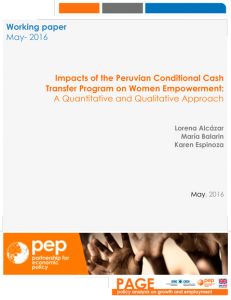Impacts of the Peruvian conditional cash transfer program on women empowerment: a quantitative and qualitative approach
| Año | : | 2016 |
|---|---|---|
| Autor/es | : | Lorena Alcázar, María Balarin, Karen Espinoza |
| Área/s | : | Etnicidad, género, ciudadanía y derechos, Metodologías de investigación y evaluación de políticas y programas sociales |
Alcázar, Lorena; María Balarin y Karen Espinoza (2016). Impacts of the Peruvian conditional cash transfer program on women empowerment: a quantitative and qualitative approach. Working Paper. PEP.
This study aims to identify the effects of the conditional cash transfer program of Peru, Juntos, on women’s empowerment. Although the program does not envisage women’s welfare as an objective per se, women play a key role as they are the main recipients of the cash transfer and are responsible for compliance with the program’s conditions and thus their empowerment level can be affected by the intervention. The study complements econometric quantitative and qualitative methods to identify the effects of Juntos on six dimensions of empowerment: economic household decision-making, freedom of movement, gender ideology, agency, self-esteem and perceptions of life. Using two data sources for the quantitative approach (ENDES and Young Lives Study), the study finds positive significant effects on women empowerment, specifically on economic household decision-making (even when considering large purchases and resources earned by the partner), self-esteem and perceptions of life, in this last case, particularly when women have been part of the program for more than three years.
These results are strongly reinforced and explained by the findings of qualitative approach. No significant results are found on agency, freedom of movement or gender ideology, but the qualitative fieldwork results show improvements on agency and freedom of movement mainly because of women participation in training sessions and informal socialization, where they are able to exchange ideas that are then incorporated into their daily lives. However, these improvements may be hampered in some cases by local management of the program in which vertical interaction between the government representatives and beneficiaries are reproduced; women appear as the passive subjects, who only receive benefits, conditions and instructions from the program.






